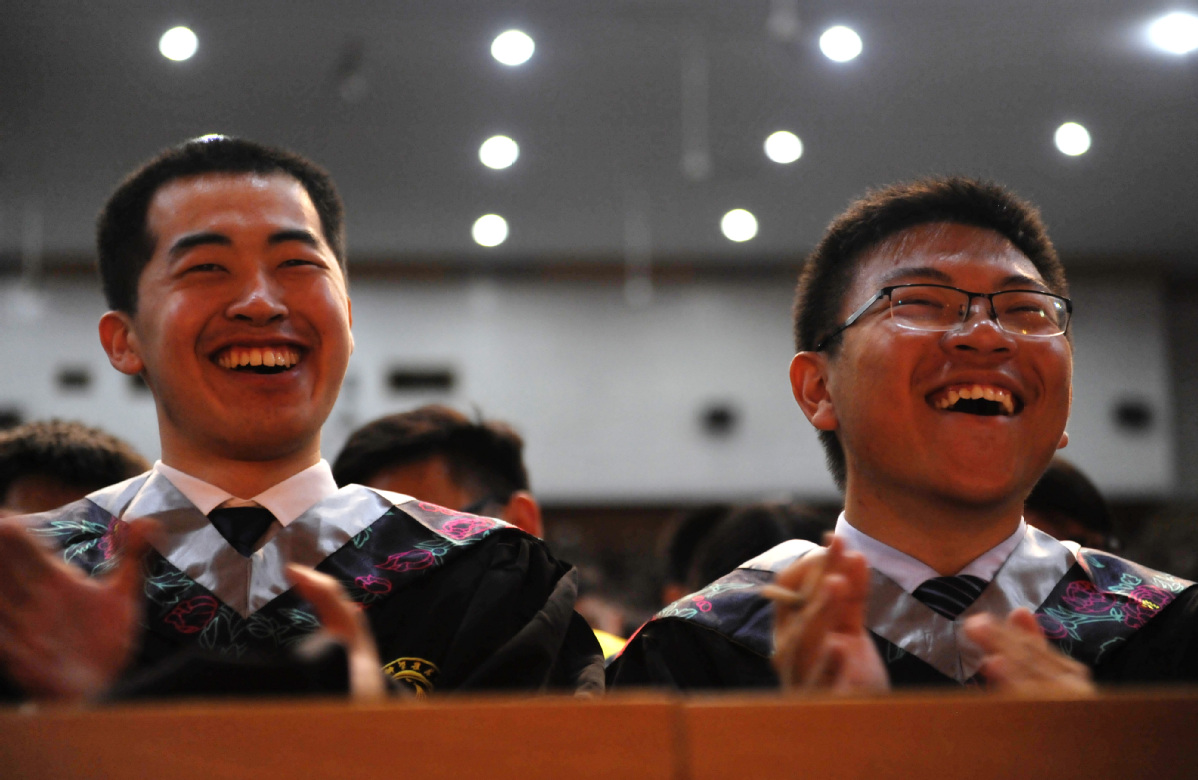
From the People’s Daily app.
This is Story in the Story.
Over four decades of development, the graduate school at USTC has set a shining example for China's higher-education development and reform.
As a top research university in China, USTC has been hailed as the “cradle of scientific elites.” It has made numerous bold moves to promote education reform and boost scientific and technological innovation.
In 1978, USTC became the first university in China to establish a school for graduates, eight years after it moved from Beijing to Hefei, Anhui Province.
The graduate school was created to meet the nation's needs for high-level talent with strong research abilities for China's socioeconomic development and to enhance the country's international competitiveness.
It was the first such institution in the country to develop an integrated talent training program, through a continuous master-doctor program and a similar bachelor-master-doctor program.
The university now has 646 professors and 729 associate professors, as well as 422 high-level professionals, such as members of the Chinese Academy of Sciences and Chinese Academy of Engineering and those included in the Changjiang Scholars program.
From 2008 to 2013, USTC was ranked number one among Chinese universities in the Nature Publishing Index China - a listing that tracks all research results published in Nature’s journals.
Today’s Story in the Story will look at some of China’s most gifted young students and how the School of the Gifted Young at USTC helps them reach their full potential.

Two graduates of the school laugh during an address delivered by one of their classmates. (Photo: CHINA DAILY)
Early this month, Zhu Yuanhao and six other students sat in the conference room of the School of the Gifted Young at the USTC, and answered questions posed by a group of reporters.
USTC students rarely give interviews, partly to avoid overexposure and because most of them are younger than 18.
To gain entry, students have to take the Gaokao years ahead of schedule. If they pass the exam and an interview, they will be accepted by the school for undergraduate studies.
This year, the university is celebrating its 60th anniversary and the 40th anniversary of the founding of the Class of the Gifted Young.
To illustrate the development of the school, the college has organized an exhibition that contains photos of many renowned alumni, mostly scientists.
One of the names on the list was Cao Yuan, who graduated from the School of the Gifted Young in 2014 and is now a 21-year-old PhD candidate at the Massachusetts Institute of Technology.
Though he appreciates Cao's success, Zhu has no plans to follow in his footsteps.
“I won't study overseas because I have a research place in Professor Du Jiangfeng's laboratory, which is the best in the world for research on quantum information,” Zhu said.
Du, who graduated from the class in 1990 after five years of study, is the vice-president of the USTC and director of its Key Laboratory of Microscale Magnetic Resonance.
Gaining entry to USTC is a tough task since it recruited just 186 students from the province this year, while the number of successful candidates from other parts of the country was even lower.
Students who fail to make the grade are released by every department in every university, and the Class of the Gifted Young is no exception.
Students in the class only attend a limited number of courses together, and in most courses, they study alongside regular students because the lectures are designed for all scholars.
All students in the School of the Gifted Young are allowed to set their own timetable, even for some compulsory courses.
They have to finish the courses and pass the exams, but they are allowed to decide the year and semester in which they will attend. While that flexibility is welcomed, it can have problems.
“In the hope of finishing their courses earlier, some students overstretch themselves and choose too many courses in the first two years,” said Lan Rong, one of 15 “proxy parents” employed by the school to oversee the young students' welfare.
Instead of questioning students, Lan said the proxies should observe their behavior to check for possible anxiety or depression and find opportunities to chat with them to discuss their problems.
In this way, the school is able to maintain a high standard of intellectual stimulation, while ensuring that the students are not troubled by burdens that can sometimes accompany exceptional talent.
Looking back over 40 years, Chen Yang, dean of the school, believes the special provisions made for academically gifted young people have not only helped them fulfill their own potential, but also proved beneficial to their teachers and the other students.
“The class has proved successful in the past 40 years and has provided a great deal of practical experience, which has had a very positive influence on the whole university,” Chen said.
(Produced by Nancy Yan Xu, Raymond Mendoza and Lance Crayon. Music by: bensound.com. Text from China Daily.)


